Project Meeting
WHAT WE’VE LEARNED & WHAT’S NEXT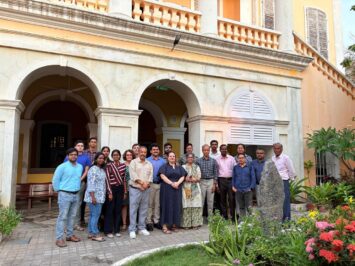
On 10 and 11 April 2025, the French Institute of Pondicherry (IFP) hosted a milestone event for the Nilgiri Archaeological Project: a two-day meeting titled What We’ve Learned & What’s Next. This gathering marked a key moment in the life of the project, bringing together team members and research partners from across India to reflect on the project’s progress and to collectively plan the next stages of research. The meeting offered a rare opportunity for all collaborators (across disciplines and institutions) to meet in person, share updates, and exchange perspectives.
Over the two days, discussions centred on fieldwork outcomes, methodological approaches, data integration, and emerging findings from the project’s diverse research strands: archaeology, archaeometry and ethnoarchaeology, palaeoecology, textual analyses, ethnohistory, and historical botany and traditional ecological knowledge. A key focus was also placed on strategies for presenting and publishing the project’s findings, including collaborative outputs that reflect the interdisciplinary and multi-vocal nature of the research.
Beyond the intellectual richness of the discussions, the meeting reinforced the Nilgiri Archaeological Project’s commitment to ethical and interdisciplinary research. Plans were made for collaborative publications, a digital platform to share data and findings, and further integration across teams working in the field, laboratories, archives, and communities.
As the project enters its next phase, this meeting laid a strong foundation for deepening our understanding of the Nilgiris’ upland histories and more-than-human landscapes.
PROGRAMME
WELCOME ADDRESS
Renaud Colson, Director, French Institute of Pondicherry
INTRODUCTION
The Nilgiri Archaeological Project Daniela De Simone (Ghent University)
ARCHAEOLOGY
Archaeological Survey: Preliminary Results and Next Steps Arjun Rao (Central University of Karnataka, Kalaburagi) and Daniela De Simone (Ghent University)
Hero-stones and Other Non-burial Funerary Monuments Letizia Trinco (Ghent University)
Remote Sensing and Environmental Change: Methodology for Landscape Reconstruction Enzo Cocca (Ghent University)
ARCHAEOMETRY & ETHNOARCHAEOLOGY
Archaeometric Study of Museum Collections: Preliminary Results and Next Steps Sharada Srinivasan (National Institute of Advanced Studies, Bengaluru)
Kota Women Pottery Making Traditions: An Ethnoarchaeological Approach S. Udayakumar (National Institute of Advanced Studies, Bengaluru) and C. Gomathi (Bharathiar University, Coimbatore)
PALAEOECOLOGY
Pollen Analyses from Three Dated Cores (Taranadu Mandu, Muthanadu Mandu, Town Vayal) K. Anupama and S. Prasad (French Institute of Pondicherry)
Phytolith Studies, Preliminary Results, and Next Steps R. Gayathri, Vivek Pandi (Manipal University), and Doris Barboni (French Institute of Pondicherry)
Analytical Approaches and Findings within the NILGIRI Archaeological Project Ramya Bala Prabhakaran (National Institute of Advanced Studies, Bengaluru)
Modern Surface Samples, Landcover and Landuse Maps, and Present Vegetation Studies J. Lazar and M. Anbarashan (French Institute of Pondicherry)
Pollen Collection from Honeycombs: Preliminary Results J. Lazar (French Institute of Pondicherry)
Fungal Spores in Palaeoecology: The Challenge of the Nilgiri Archaeological Project M.B. Govinda Rajulu and T.S. Suryanarayanan (Vivekananda Institute of Tropical Mycology, Chennai)
DNA and SedADNA Analysis: Issues and Opportunities for the Nilgiri Archaeological Project G. Kumaresan (Madurai Kamaraj University)
Sedimentary Geochemistry and Isotope Studies: First Results and Future Prospects Pramod Singh and Ronald Terieng (Pondicherry University)
TEXTUAL SOURCES
Textual Sources and the Otherness of Forest-dwellers Ananya Vajpeyi (Centre for the Study of Developing Societies, New Delhi/Ashoka University)
Mountain and Forest People in Tamil Literature V. Prakash (University of Texas, Austin/French Institute of Pondicherry)
ETHNOHISTORY
Indigenous Oral Histories and the Reconstruction of the Past N. Ramesh (University of Hyderabad) and Daniela De Simone (Ghent University)
HISTORICAL BOTANY AND TRADITIONAL ECOLOGICAL KNOWLEDGE
Plants, People and the Past Daniela De Simone (Ghent University)
Research Assistants and Students: introductions
Nithya Basith (Madras Christian College)
Melvin Chowdury (Ghent University)
Divyendu Kashyap (French Institute of Pondicherry/Ghent University) Kunjunni Sajeev French Institute of Pondicherry/Ghent University)
International Symposium
NARRATIVES OF EXCLUSION: THE OTHERING OF FOREST-DWELLERS IN PRE-MODERN INDIAN TEXTS
 Ghent University, 17-18 June 2024
Ghent University, 17-18 June 2024
This symposium aims to explore the multifaceted portrayals of Indian forest-dwellers in pre-modern textual sources, shedding light on the complex dynamics of “othering” and its implications for understanding historical interactions between sedentary civilisations and indigenous forest communities. Drawing upon a wide array of pre-colonial texts, including religious scriptures, epic narratives, and regional historical documents, we will delve into the narratives and characterisations that have historically marginalised forest-dwellers, casting them as the “Other.”
We will critically analyse how these texts construct the identies of forest- dwellers, often depicting them as peripheral or antithetical to the societal norms of mainstream agrarian cultures. Through examining the themes of wilderness versus civilisation, purity versus pollution, and order versus chaos, we will gain insights into the underlying ideologies that fuelled such representations. Furthermore, we will discuss the implications of these textual portrayals for the social hierarchy, cultural assimilation, and conflict between forest communities and expanding agrarian societies. The objective of the workshop is to challenge entrenched narratives, advocating for a more inclusive historiography that acknowledges the diverse experiences and contributions of India’s forest communities.
PROGRAMME
Introduction
Daniela De Simone (Ghent University) and Ananya Vajpeyi (Centre for the Study of Developing Societies, New Delhi), The Nilgiri Archaeological Project and the pre-modern history of forest- dwellers
Keynote lecture
Brian Black (Lancaster University), Nāgas in the jātakas and Mahābhārata: Narratives of exclusion and inclusion
Forest-dwelling Communities
Eva De Clercq (Ghent University) The forest and forest dwellers in the Jain Rāmāyaṇas
Rosina Pastore (Ghent University) The othering of forest-dwellers in the Rāmcaritmānas
V. Prakash (French Institute of Pondicherry) The Caṅkam people and their landscape: The exchanges of the forest and mountain dwellers with different eco-landscapes
Lidia Wojtczak (SOAS) “Robber bands defined ethnically,” Bhils in South Asian literature
Saarthak Singh (Ghent University) and Ayesha Sheth (University of Pennsylvania)
Views of and from the margins: Gonds and Gondwana in military and music texts, 15th-16th centuries
Ewa Debicka-Borek (Jagiellonian University, Krakow) The Chenchus in the Vāsantikāpariṇayam
Forests, Forest-dwellers and Kingship
Ananya Vajpeyi (Centre for the Study of Developing Society, New Delhi) Mainstream and margin in the making of the Maratha polity: Who was Shivaji?
Dániel Balogh (Humboldt University, Berlin) Images of chaos and stability in Eastern Cālukya grants
Samana Gururaja (Humboldt University, Berlin) and Daniela De Simone (Ghent University)
Forging identity in the uplands: The Hoysaḷas as “Lord among hill-chiefs” in medieval South India
Wilderness and Medical Knowledge
Annalisa Bocchetti (Ghent University) Monsters or healers? The representation of forest inhabitants in the Sufi premakathās
Vitus Angermeier (University of Vienna) Doctors between civilisation and wilderness: medical geography in pre-modern South Asia
Discussants
Sunil Gupta (Max Planck Institute for the History of Science, Berlin)
Sara Mondini (Ghent University)
Letizia Trinco (Ghent University)
More on memorial stones and animals: a conversation on dogs and South Indian hero-stones at the Department of History of Ashoka University, Delhi
 On 17th April 2024 Letizia shared a bit more of her ongoing research on the memorialisation of animals in pre-modern India with students and researcher at the Department of History at Ashoka University, Sonipat, on the occasion of the Spring Seminar 2024.
On 17th April 2024 Letizia shared a bit more of her ongoing research on the memorialisation of animals in pre-modern India with students and researcher at the Department of History at Ashoka University, Sonipat, on the occasion of the Spring Seminar 2024.
In searching for clues about the biological and environmental aspects of the dog-human relation in South Asia, an often overlooked class of archaeological artefacts, the so-called hero-stones, appears as a source full of potential. While they directly testify to the key role of dogs in defence, hunting and warfare contexts, memorial stones may indirectly inform us on the extent of the bond between dogs and their human masters: carvings and inscriptions give a glimpse of the actual co-existence of the two species in the environment they shared, beyond any symbolical superstructure conveyed by literary and religious sources.
As a spin-off of the study of hero-stones on the Nilgiri Mountains of Tamil Nadu, the study of the representation of dogs and other non-human animals on the memorial stones of South India will contribute to a deeper understanding of the environmental and cultural configuration of this macro-region in the past.
Kota pottery techniques of the Nilgiris at the 8th International Congress of Society of South Asian Archaeology (SOSAA), Patna
 Exploring ancient technology through an experimental archaeology and ethnographic perspective: Iron smelting process, Bone tool making process and Pottery techniques: in his most recent talk our colleague Udayakumar S. (NIAS, Bangalore) presented, among the rest, the traditional pottery-production techniques used by the Kotas of the Nilgiris at the 8th International Congress of Society of South Asian Archaeology (SOSAA) organised by the Bihar Museum, Patna, and the Directorate of Archaeology Department of Art, Culture & Youth, Government of Bihar from 4th to 7th April 2024.
Exploring ancient technology through an experimental archaeology and ethnographic perspective: Iron smelting process, Bone tool making process and Pottery techniques: in his most recent talk our colleague Udayakumar S. (NIAS, Bangalore) presented, among the rest, the traditional pottery-production techniques used by the Kotas of the Nilgiris at the 8th International Congress of Society of South Asian Archaeology (SOSAA) organised by the Bihar Museum, Patna, and the Directorate of Archaeology Department of Art, Culture & Youth, Government of Bihar from 4th to 7th April 2024.
The term experimental archaeology is a convenient way of describing the collection of facts, theories and fiction that have been assembled through a century of interest in the reconstruction and function of ancient remains. Udayakumar has taken three different techniques for his experimental study: iron smelting process, bone tool-making process and pottery-making techniques. All data presented is based on extensive ethnographic fieldworks and understanding of the artisans’ traditional knowledge.
With respect to the pottery production, the author has nailed all stages involved in the process (preparation of clay, hand-made pottery and wheel-made pottery, burnishing, pottery pre-heating, pottery firing) as observed in case studies from Central India and South India, including the Nilgiri Mountains of Tamil Nadu.
Udayakumar S brings the Kota pottery production of the Nilgiris to the 3rd International Conference in Commemoration of Padma Shri Awardee Iravatham Mahadevan, Chennai
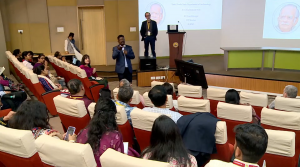 Our team member Udayakumar S from NIAS, Bangalore, participated in the 3rd International Conference in Commemoration of Padma Shri Awardee Iravatham Mahadevan dedicated to History, Science and Technology of South Asian Ceramics, which took place in Chennai between 5th and 9th January 2024.
Our team member Udayakumar S from NIAS, Bangalore, participated in the 3rd International Conference in Commemoration of Padma Shri Awardee Iravatham Mahadevan dedicated to History, Science and Technology of South Asian Ceramics, which took place in Chennai between 5th and 9th January 2024.
With his contribution Experimental Archaeology and Ethnoarchaeology – Pottery Techniques Perspective, Udayakumar illustrated the latest results of his study on the Kota pottery tradition conducted in 2023 in the frame of the Nilgiri Archaeological Project.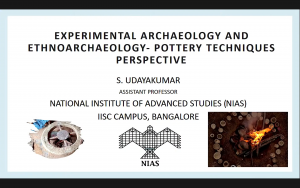
The Kotas are one of the several ethnic groups traditionally inhabiting the Nilgiri Mountains of Tamil Nadu, and nowadays their community is concentrated in just seven villages. They are well known in the region as pottery makers. Their special techniques were transmitted from generation to generation, but they are increasingly endangered due to the fast-paced changes of the local economy and social structure.
Apart from illustrating local pottery making techniques and firing methods, Udayakumar correlated them to those of neighbouring regions, thus highlighting the occurrence of interregional exchanges.
Presentation at the 27th ECSAS Conference in Turin
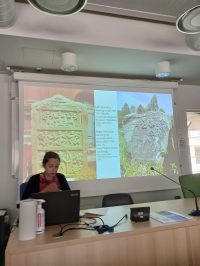
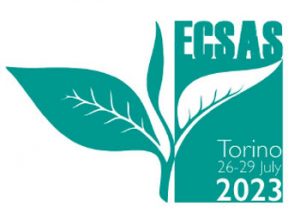 Letizia Trinco presented at the 27th European Conference on South Asian Studies (ECSAS) which took place in Turin from 26th to 29th July 2023.
Letizia Trinco presented at the 27th European Conference on South Asian Studies (ECSAS) which took place in Turin from 26th to 29th July 2023.
Her talk titled “Perspectives on the dog-human interaction in ancient India between funerary evidence and non-Sanskrit sources” contributed to the panel More than human: Animal-Human Relations in Pre-Modern South Asia.
The presentation focused on hero-stones and the memorialisation of non-human animals. Hero-stones are a conspicuous part of the archaeological heritage of the Nilgiris. Like in many other regions of India, these memorials were erected to commemorate the death of people who passed away in circumstances perceived by the community as exceptional. Sometimes hero-stones do not just commemorate people, but also their faithful non-human companions: this is the case of some hero-stones between Tamil Nadu and Karnataka dedicated to dogs, a further proof of the millennium-old biological connection between the human species and the domesticated species par excellence, which turned into a socio-emotional bond. While a wealth of archaeological data from all over the world testify to the various forms of this interspecies interaction, India – and above all the lowland regions around the Nilgiris – offers some unique evidence from the Medieval period.
Research Seminar Encounters in the Forests: Representations of Forest-dwellers in the Indian Epics led by Ananya Vajpeyi, Centre for the Study of Developing Societies, New Delhi
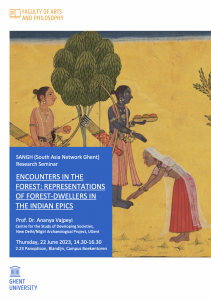 Ananya Vajpeyi
Ananya Vajpeyi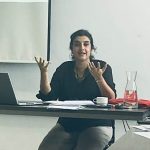 , who has recently joined the Nilgiri Archaeological Project as a research consultant to investigate how forest-dwellers, “tribals” and other marginal groups have been represented in Sanskrit literature, spent the month of June 2023 at UGent as Visiting Professor.
, who has recently joined the Nilgiri Archaeological Project as a research consultant to investigate how forest-dwellers, “tribals” and other marginal groups have been represented in Sanskrit literature, spent the month of June 2023 at UGent as Visiting Professor.
On 22nd June, Ananya led the research seminar Encounters in the Forests: Representations of Forest-dwellers in the Indian Epics for the members of our research group SANGH (South Asia Network Ghent). The seminar focused on two well-known representations of forest-dwellers from the epics, Ekalavya, a Niṣāda prince, from the Mahābhārata, and Śabarī, an aged female ascetic, from the Rāmāyaṇa.
From Vyāsa’s Mahābhārata, we read the episode of Ekalavya’s unhappy encounter with Guru Droṇācārya, the teacher in charge of training the Kaurava and Pāṇḍava princes to be excellent kṣatriya warriors. We also read the story of Śabarī from the Rāmcaritmānas by Tulasidas, as he is the one to give prominence to the story of her encounter with Rāma. (She plays a relatively minor role in the Valmīki Rāmāyaṇa).
The seminar represents the official start of our work on the construction of the otherness of forest-dwellers in Indian textual sources.
Workshop Global Outlands at the Östasiatiska Museet in Stockholm
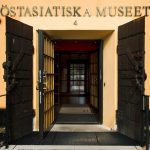 The two-day workshop Global Outlands was co-organised by Uppsala University, the Upplandsmuseet, and the Östasiatiska Museet in Stockholm on 24th and 25th May 2023. The project Global Outlands based at Uppsala University aims to generate new knowledge regarding what role the large-scale resource exploitation of non-agrarian resources played in societal development in the prehistoric and historic periods. The purpose of the workshop Global Outlands was to bring together international researchers with an interest in questions concerning the exploitation of non-agricultural lands, and products, and how these lands were integrated in networks of production and exchange.
The two-day workshop Global Outlands was co-organised by Uppsala University, the Upplandsmuseet, and the Östasiatiska Museet in Stockholm on 24th and 25th May 2023. The project Global Outlands based at Uppsala University aims to generate new knowledge regarding what role the large-scale resource exploitation of non-agrarian resources played in societal development in the prehistoric and historic periods. The purpose of the workshop Global Outlands was to bring together international researchers with an interest in questions concerning the exploitation of non-agricultural lands, and products, and how these lands were integrated in networks of production and exchange.
Daniela De Simone was invited to introduce the Nilgiri Archaeological Project and present on our research on the key role that Indian forest-dwellers played for centuries in the Indian Ocean trade as the primary suppliers of forest products.
Poster presentation at the Young Researchers Overseas Day of the Royal Academy for Overseas (RAOS)
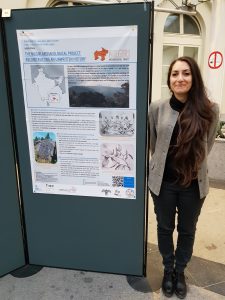 On 12th December 2022, Letizia Trinco participated in the Fifth Edition of the Young Researchers Overseas Day organised by the Royal Academy for Overseas Sciences (RAOS) at the Palace of the Academies in Brussels.
On 12th December 2022, Letizia Trinco participated in the Fifth Edition of the Young Researchers Overseas Day organised by the Royal Academy for Overseas Sciences (RAOS) at the Palace of the Academies in Brussels.
With her poster presentation, she illustrated the scopes of the Nilgiri Archaeological Project, highlighting her contribution to it between archaeological surveys, the investigation of museum collections and the study of botanical treatises predating the British colonial period.
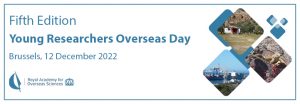
Trip to India: meeting research partners in Puducherry and Bengaluru, viewing museum collections in Udhagamandalam
Between 19th November and 4th December 2022 Daniela De Simone and Letizia Trinco were in India in order to meet their research partners at the French Institute of Pondicherry (IFP) and at the National Institute for Advanced Studies of Bengaluru (NIAS). Arrangements were made for the joint fieldwork on the Nilgiris which will start soon – stay tuned!
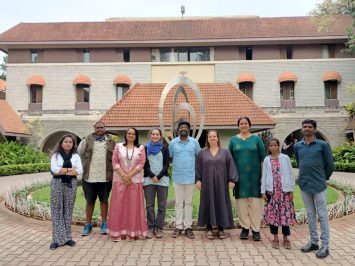
We discussed about (and participated in!) test techniques in archaeometallurgy with Sharada Srinivasan and her team; we reviewed the potential of different paleoenvironmental proxies with Anupama Krishnamurty, Prasad Srinivasan and their collaborators; we defined pros
pective challenges in surveying and evaluated the best options for remote sensing on the Nilgiris together with IFP consultants.
Last but not least, Udhagamandalam! This preliminary visit to the Nilgiris allowed us to carry out a first examination of the Ni
lgiri archaeological collection at the Government Museum with its curator, K.A. Murugavel, as well as to view the ethnographic collection at the Tribal Museum of the town.
The Nilgiri Archaeological Project hosted the international workshop Of Exotic Plants, Wild Beasts and Precious Gems: South Asian Forest-dwellers and the Making of World Civilisation (Late Neolithic to Early Colonial Period)
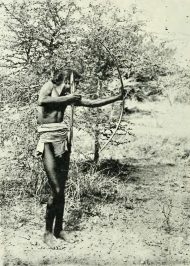
On 26th October 2022, Daniela De Simone and Sunil Gupta hosted the international workshop Of Exotic Plants, Wild Beasts and Precious Gems: South Asian Forest-dwellers and the Making of World Civilisation (Late Neolithic to Early Colonial Period). Dr. Sunil Gupta (Indian Archaeological Society) is currently Visiting Scholar in the Department of Languages and Cultures at Ghent University where he contributes to the scientific activities of the research group SANGH (South Asian Network Ghent).
The earliest evidence of exchange of South Asian forest products outside the region dates to the Neolithic period. Forest products include plant materials and animal by-products, such as spices and ivory, as well as gemstones, metals and timber. In the early centuries CE, with the growing demand for forest products in Indian cities and the intensification of the Indian Ocean trade that lived off the commerce of those products, South Asian forest-dwellers increasingly used their ecological knowledge, particularly in terms of spatial distribution and seasonal availability, to become the primary suppliers of internal and external markets thus connecting themselves to short- and long-distance exchange networks. However, in the early 19th century, the British colonial enterprise started to “legally” appropriate forested land from indigenous owners, relegating South Asian forest-dwellers to a subaltern role in the global economy of the following centuries.
The Indian Ocean trade, as well as the coastal polities and European colonies that thrived on the commerce of forest products, would have not existed without the active engagement of South Asian forest communities. The aim of this workshop is to understand the key role that South Asian forest-dwellers played over the long-term, not only within the urban economies of the region, but in the making of world civilisation given that the forest products they gathered and supplied were extensively used to, for example, concoct medicine, prepare food, create artworks, craft luxury items, and build ships.
WORKSHOP PROGRAMME
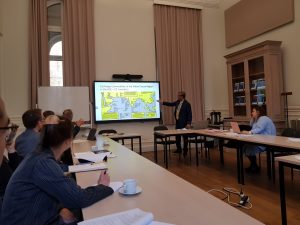
- Daniela De Simone, Ghent University and Sunil Gupta, Indian Archaeological Society
Of Exotic Plants, Wild Beasts and Precious Gems: Introduction - Sunil Gupta, Indian Archaeological Society
Late Prehistoric to the Early Historic: forest dwellers of the Indian subcontinent in early Indian Ocean exchange networks (5th-4th millennium BCE–early 1st millennium CE) - Katrien De Graef and Mirko Surdi, Ghent University
“Black Land, may your trees be great trees!” New approaches to the wood and vegetable goods trade from Meluhha to Mesopotamia in the late third and early second millennium BCE - Irene Salvo, University of Exeter
Ingredients from India in ancient Greek and Roman magic - Matthew Cobb, University of Wales Trinity Saint David
The hill and forest products of the Tamilakam: communication and exchange between southern India and the Roman world - Ariane de Saxcé, German Archaeological Institute, Bonn
The export of South Asian forest products during Early Historic times - Eva Myrdal, National Museum of World Culture, Stockholm
Iron, wild cinnamon and honey in Sri Lanka: what is needed to write the history of the people engaged in extraction and production? - Daniela De Simone and Letizia Trinco, Ghent University
Jain merchants, forest temples, and the spice trade in medieval Kerala - Sara Mondini, University of Venice “Ca’ Foscari”
Muslim trades on the Malabar coast - Michael Willis, Royal Asiatic Society and Saarthak Singh, New York University
What’s for dinner? Does the “Ni’matnāmah Naṣir al-Dīn Shāhī” provide data about foods and other products from the highlands? - Alessandro Ghidoni, University of Exeter
Timber and fibre: South Asian materials in western Indian Ocean watercraft - Erik Odegard, International Institute of Social History, Amsterdam
European shipbuilding with Indian teak, the case of Cochin
The Nilgiri Archaeological Project at the 2022 IMC in Innsbruck
 From 11th to 15th September 2022 Daniela and Letizia attended the 2022 International Mountain Conference (IMC) which took place amidst the scenic Alpine settings of Innsbruck, Austria.
From 11th to 15th September 2022 Daniela and Letizia attended the 2022 International Mountain Conference (IMC) which took place amidst the scenic Alpine settings of Innsbruck, Austria.
The IMC is the broadest world conference on mountain research and favours a multidisciplinary approach to the study of mountain systems around the world by bringing together ecology, climatology, history, economics, social sciences, cultural studies etc.
Our work on the Nilgiri Mountains contributed to the session “Social strategies and rituality in ancient mountain landscape” with the following presentations:
- Daniela De Simone, The Megalithic Tombs of the Nilgiri Mountains of South India as Ritual Community Monuments
- Letizia Trinco, Sacred groves and dolmens: some aspects of the ritual landscape of the Kurumba and Badaga communities of the Nilgiri Mountains of South India
Long life to mountain systems!
Ghent Team and IFP Team talk about the Nilgiris at the 25th EASAA Conference in Barcelona

Daniela De Simone, Letizia Trinco, together with Anupama Krishnamurti and Prasad Srinivasan, our research partners at the French Institute of Pondicherry (IFP), presented at the 25th Conference of the European Association for South Asian Art and Archaeology (EASAA) hosted in Barcelona, Spain, from 4th to 8th July 2022.
In our talks, we explored the environmental and historical identity of the Nilgiris from different angles:
- Anupama K, Prasad S: Pollen-based landscape reconstruction of Nilgiris, South India: some paleoecological and archaeological perspectives
- Daniela De Simone: An Unwritten Past: An Outline of the Long-term history of the Toda Community of the Nilgiri Mountains
- Letizia Trinco: Whose satīs? Reflections on the so-called “satī-stones” of the Nilgiri Mountains of Tamil Nadu: from old (un)certainties to new perspectives
Looking forward to bringing our newest results to the 2024 EASAA edition!
Documenting the Mantegazza collection in Florence
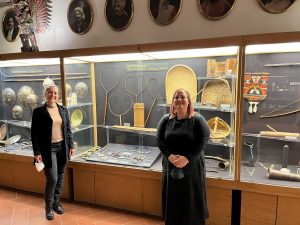 In April and September 2022, Daniela and Letizia spent some days at the Museum of Anthropology and Ethnology of the University of Florence to document a collection of Nilgiri artefacts gathered in 1882 by Paolo Mantegazza, an Italian physician and anthropologist. The Mantegazza collection includes over 80 ritual objects, ornaments, and tools and is the largest collection of Toda artefacts outside India. In his Studii sulla Etnologia dell’India (1886), Mantegazza carried out a study of the indigenous communities of the Nilgiris based on his fieldwork in India in the early 1880s. Mantegazza was a contemporary of Charles Darwin with whom he held an intense epistolary correspondence.
In April and September 2022, Daniela and Letizia spent some days at the Museum of Anthropology and Ethnology of the University of Florence to document a collection of Nilgiri artefacts gathered in 1882 by Paolo Mantegazza, an Italian physician and anthropologist. The Mantegazza collection includes over 80 ritual objects, ornaments, and tools and is the largest collection of Toda artefacts outside India. In his Studii sulla Etnologia dell’India (1886), Mantegazza carried out a study of the indigenous communities of the Nilgiris based on his fieldwork in India in the early 1880s. Mantegazza was a contemporary of Charles Darwin with whom he held an intense epistolary correspondence.
Daniela De Simone interviewed by The Federal
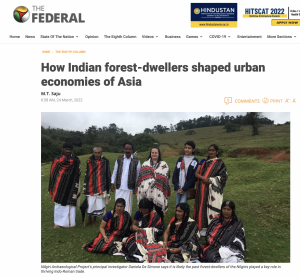 Our PI, Daniela De Simone, gives an interview to M.T. Saju for The Federal on the aims and objectives of the Nilgiri Archaeological Project and why she fell in love with the people and the environment of the Nilgiri Mountains.
Our PI, Daniela De Simone, gives an interview to M.T. Saju for The Federal on the aims and objectives of the Nilgiri Archaeological Project and why she fell in love with the people and the environment of the Nilgiri Mountains.
Daniela De Simone’s article is published in Asian Perspectives
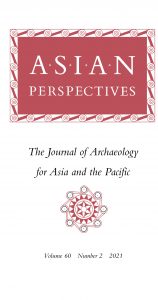 The article “Grave Goods from Megalithic Burials in the Upland Forests of the Nilgiri Mountains, South India: Analysis and Chronology” by our PI, Daniela De Simone, has been published in Asian Perspectives.
The article “Grave Goods from Megalithic Burials in the Upland Forests of the Nilgiri Mountains, South India: Analysis and Chronology” by our PI, Daniela De Simone, has been published in Asian Perspectives.
The article examines the grave goods excavated in the nineteenth century from megalithic burials on the tops and ridges of the Nilgiri Mountains in southern India, an area of montane subtropical forests. This analysis is based on the study of the collection of Nilgiri grave goods held at the British Museum combined with a preliminary survey around the Nilgiri towns of Udhagamandalam and Kotagiri in Tamil Nadu that was carried out in November and December 2018. The article presents a stylistic and typological study of the Nilgiri grave goods based on a comparative analysis with analogous artefacts excavated at other South Asian sites and proposes an improved chronology for these materials.
You can find a list of our team’s publications here.
Daniela De Simone gives talk at the Central University of Karnataka
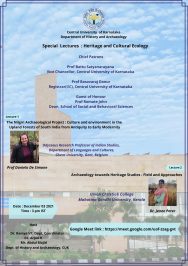 On Friday, 3rd December 2021 Daniela De Simone, our PI, gave a talk on the Nilgiri Archaeological Project to the faculty members and students of the Department of History of the Central University of Karnataka. She presented the project for the first time since its beginning in September 2021 and illustrated the work carried out so far on the archaeology of the Nilgiri Mountains by her and our postdoc, Letizia Trinco. While we wait to return to the ‘Blue Mountains’, we look forward to introduce the Nilgiri Archaeological Project to our colleagues in India and around the world at other online events planned in early 2022.
On Friday, 3rd December 2021 Daniela De Simone, our PI, gave a talk on the Nilgiri Archaeological Project to the faculty members and students of the Department of History of the Central University of Karnataka. She presented the project for the first time since its beginning in September 2021 and illustrated the work carried out so far on the archaeology of the Nilgiri Mountains by her and our postdoc, Letizia Trinco. While we wait to return to the ‘Blue Mountains’, we look forward to introduce the Nilgiri Archaeological Project to our colleagues in India and around the world at other online events planned in early 2022.